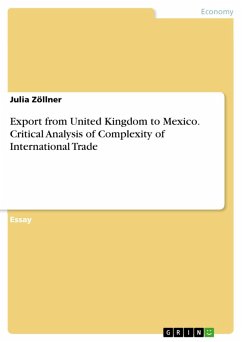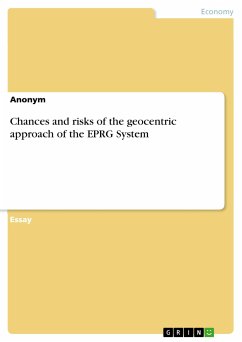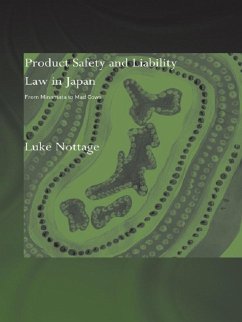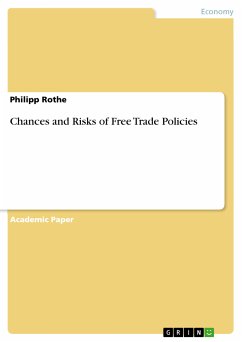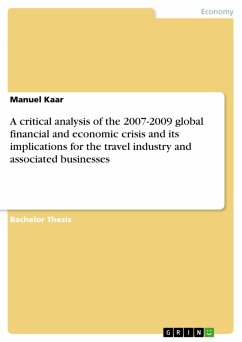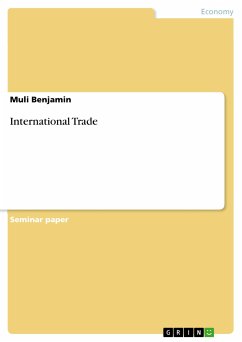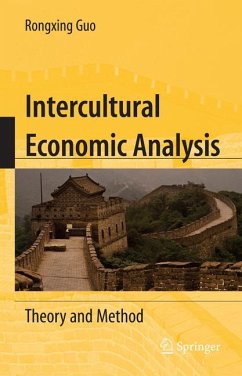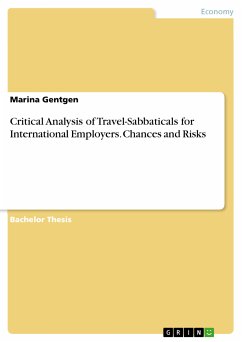
Critical Analysis of Travel-Sabbaticals for International Employers. Chances and Risks (eBook, PDF)
Sofort per Download lieferbar
Statt: 47,95 €**
29,99 €
inkl. MwSt. und vom Verlag festgesetzt.
**Preis der gedruckten Ausgabe (Broschiertes Buch)
Alle Infos zum eBook verschenkenWeitere Ausgaben:

PAYBACK Punkte
0 °P sammeln!
Bachelor Thesis from the year 2017 in the subject Economics - Other, grade: 1,7, University of Applied Sciences Essen, course: Abschlussarbeit des Bachelor Studiengangs International Management, language: English, abstract: The objective of this thesis is to shed more light on the subject of travelling during sabbaticals as a personnel policy instrument for IHRM to set new motivation, commitment incentives with various development perspectives for their employees in this challenging environment by a critical analysis of its potential chances and risks. For this purpose, the present thesis is s...
Bachelor Thesis from the year 2017 in the subject Economics - Other, grade: 1,7, University of Applied Sciences Essen, course: Abschlussarbeit des Bachelor Studiengangs International Management, language: English, abstract: The objective of this thesis is to shed more light on the subject of travelling during sabbaticals as a personnel policy instrument for IHRM to set new motivation, commitment incentives with various development perspectives for their employees in this challenging environment by a critical analysis of its potential chances and risks. For this purpose, the present thesis is subdivided into seven chapters. While in the chapter 1, the problem statement has already been demonstrated and the limitations on the elaboration with the goal of a straight-line work and a clear scope will follow, the real scientific work starts in chapter 2. This chapter gives an understanding of the challenges and characteristics of internationally operating companies. It serves to create a fundamental understanding of how Travel-Sabbaticals can play a role for these companies. In order to make the necessities and challenges of the international employers, clearer, selected contents on cultural diversity and the importance of intercultural competences, the complexity of the IHRM and the new requirements due to global trends are covered. In chapter 3, general theoretical foundations of the basis construct sabbatical are presented. The theory is supplemented by insights into international companies handling of sabbaticals and already achieved experiences with this instrument. Based on the previous, chapter 4 deals with the new approach Travel-Sabbatical, which can be seen as a specific upgrade of sabbaticals. Hereto the history and meaning of travelling is focused on and a closer look will be taken on the previously cited quotation from Goethe. This is followed by the definition of and further information on Travel-Sabbaticals to build the base for a profound understanding of what is needed in the next chapters. Chapter 5 is then explicitly dedicated to chances and economic advantages for international employers. It investigates the positive effects on the employees due to travelling during the professional time out. Chapter 6 is focused on the risks and costs that may arise with the personnel policy instrument Travel-Sabbatical. It completes the critical analysis of chances and risks with a simplified cost-benefit analysis. Finally, the most important results will be summed up und supplemented by recommendations for action in chapter 7 and the perspectives of employees, the most important success capital for companies, will be in the limelight of Travel-Sabbaticals.
Dieser Download kann aus rechtlichen Gründen nur mit Rechnungsadresse in A, B, BG, CY, CZ, D, DK, EW, E, FIN, F, GR, HR, H, IRL, I, LT, L, LR, M, NL, PL, P, R, S, SLO, SK ausgeliefert werden.




